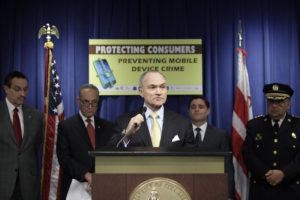
[Federal Communications Commission Photo / Public Domain]
This is the worst act of police brutality that I’ve seen. The reason I say that,” is because of its deliberate nature.
Kelly argues that by holding his knee on Floyd’s neck, Officer Derek Chauvin “was casual. It looks like he has his hand in his pocket. I’ve never seen anything that bad. Many times, it’s a rash act, a mistake in judgment, that sort of thing. Not here.”
The people protesting peacefully after the killing of Floyd, continues Kelly, “absolutely have a point. This is a watershed moment.”
But the former commissioner, who oversaw the policing of “hundreds of protests” in New York, is also dismayed, reports Mr. Varadarajan, by the “taunting and goading” of police officers by demonstrators:
I’m amazed at how blatant it is, and how nothing has been written about it. Police are “in the business of protecting the right to protest, but you’d like to have a compact between protesters and the police, that you don’t try to create an incident.
Ray Kelly proudly claims that under his tenure, NYPD became “the most diverse police department in the world. We have police officers born right now in over 100 countries.” He even started a cricket league,” he says, appealing to, as Mr. Varadarajan points out, the interviewer’s sensibilities. “It got a lot of press in India, but it got nothing over here.”
Mr. Kelly readily acknowledges there are problems in police-minority relations in the U.S., and he offers a few solutions of his own.
#1. Rigorous Psychological Testing
Mr. Kelly would have a major educational institution like Johns Hopkins, or someplace like that” devise a rigorous method of “psychological testing” for potential recruits. “It’s critical,” he says, “that you not hire your problems. Right now, I don’t think we’re identifying enough people who have deep-seated psychological problems.”
#2. Allow Police Execs to Terminate Abusive Officers
Kelly would “give police executives the ability—when significant evidence is shown to them—to terminate officers who abuse their authority either verbally or physically.” Such abusive patterns, he points out, “develop fairly quickly” in an officer’s career, but “it’s difficult, very difficult, to terminate someone.”
Mr. Kelly says “the unions certainly play a role” in making it hard to fire bad cops, and civil-service protections are an even greater obstacle. “Oftentimes,” he says of his experience in the NYPD, “someone who you’re trying to get rid of wins the appeal” at the Civil Service Commission. (link deb’s The Elephant in the Room
#3. Every Officer to Have a College Degree
Currently, the NYPD requires recruits to have a high-school diploma and 60 college credits. More college graduates in uniform, he believes, would lead to more racially sensitive policing. “I have made that argument for many, many years,” he says. One rejoinder is that “it would impact adversely on minority candidates, but our research showed no, it wouldn’t.” The college requirement would have to be introduced “incrementally, of course.” The department would need to find the money to pay what a college graduate would expect—something that would be harder if defunding takes hold.
#4. Don’t End Qualified Immunity
Qualified immunity protects police officers from many civil lawsuits. House Democrats have unveiled a bill that would abolish such immunity, an idea Mr. Kelly says is a recipe for police inaction: “If you’re personally liable and in a high-risk business, chances are your risk-taking is going to be quite a bit less,”
Mr. Kelly continues, “I would say that’s probably bad for society.”
Mr. Kelly reminds Mr. V. how short the public’s memory is.
Crime rates in New York steadily fell for almost 30 years starting around the time of Mr. Kelly’s first stint as commissioner. But people have “become complacent,” he says. “They expect low crime.” The population of New York City “turns over about 40% every 10 years. So you don’t have a great many people who remember the bad old days of the ’80s and the’90s.”
If you’re willing to fight for Main Street America, click here to sign up for the Richardcyoung.com free weekly email.







